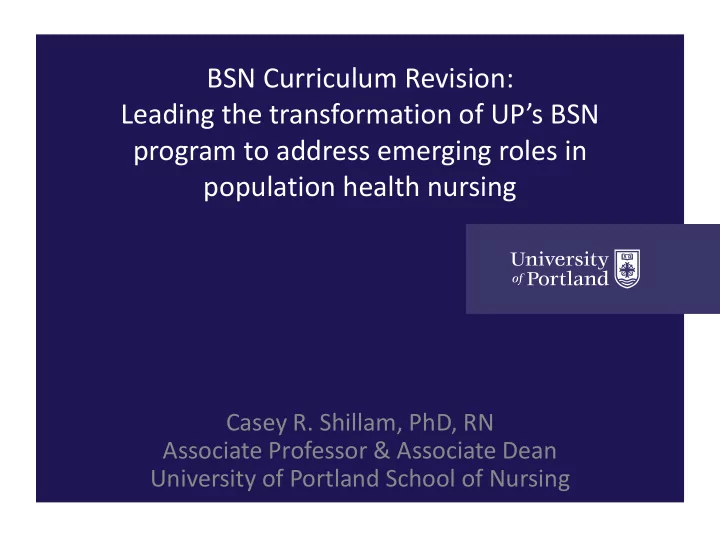

BSN Curriculum Revision: Leading the transformation of UP’s BSN program to address emerging roles in population health nursing Casey R. Shillam, PhD, RN Associate Professor & Associate Dean University of Portland School of Nursing
Objectives 1. Describe the current population health trends in nursing education 2. Identify 3 key strategies for stakeholder engagement in curriculum revision 3. Describe key elements of UP SON new BSN curriculum addressing population health
Clinical Partners • Lead teams and understand their role on the team • Manage complex patients and function as case managers • Understand, manage, and be familiar with nursing informatics • Manage mental health populations across the continuum of care
Clinical Partners • Provide holistic care • Understand the financial implications of care • Function in all areas of care: ambulatory, community, acute, post-acute, & public health • Promote illness prevention and health promotion
Considering Curriculum Revision • Recognized over 10 years since major revision • Saw need to meet emerging health and health care demands in the community • Transition focus from acute care nursing to population health
Goals of Curriculum Revision We want our students to be: Confident, experienced, resilient, transformational leaders, risk takers, difference makers, and game changers.
Goals of Curriculum Revision We want our students to: Pass NCLEX, practice ethically, practice at the top of their license, be clear in their roles and responsibilities as nurses, have a loud voice in health policy decisions and participate with interdisciplinary teams.
Curriculum Revision But how???
Value-based versus Volume-based Care
Josiah Macy Foundation Ambulatory Care Conference Conference Themes: • Changing the Healthcare Culture • Transforming the Practice Environment • Educating Nursing Students in Primary Care • Supporting the Primary Care Career Development of RNs • Developing Primary Care Expertise in Nursing School Faculty • Increasing Opportunities for Interprofessional Education
Josiah Macy Foundation Ambulatory Care Report Key findings of the report: • Education – prepare nurses to practice to the full extent of education and training in primary care • Practice – develop models of team-based care that fully capture nursing scope of practice
Josiah Macy Foundation Recommendations • # 1. Leaders of nursing schools, primary care practices, and health systems should actively facilitate culture change that elevates primary care in RN education and practice. • # 3. Nursing school leaders and faculty should elevate primary care content in the education of pre-licensure and RN-to-BSN students.
Josiah Macy Foundation Recommendations • # 5. Academia and healthcare organizations should partner to support and prepare nursing faculty to educate pre-licensure and RN-to-BSN students in primary care knowledge, skills, and perspectives. • # 6. Leaders and faculty in nursing education and continuing education programs should include interprofessional education and teamwork in primary care nursing curricula.
Curriculum Revision Again . . . how???
Inspiring nurse leaders of the future Values Personality Social Justice Inspirational Inspiring nurse leaders Academic of the future through academic Excellence excellence to create systems and Transformative environments that support optimal Integrity health & wellness Innovative Compassion Resilience
New Mission The University of Portland School of Nursing educates nurse leaders of the future through innovative learning and engagement that enriches the culture of healthcare to promote health and wellness of the population. Faculty, staff, and students are accountable for fostering a spirit of discovery and creating an environment that cultivates lifelong learning.
New Vision The University of Portland School of Nursing creates positive change in healthcare through academic excellence to improve the health of society.
New Program Outcomes Graduates of the BSN program will be prepared to: • Provide safe, high-quality nursing care to individuals. • Deliver holistic nursing care to populations across a health care continuum . • Contribute to the nursing profession. • Improve health care delivery across the continuum of care. • Create and support healthy work environments.
New Program of Study
Next steps . . . • Continue with stakeholder engagement – Public health – Ambulatory care – Primary care – Current health system practice partners • Transitions in DEU model • Prepare faculty • Prepare students
Recommend
More recommend